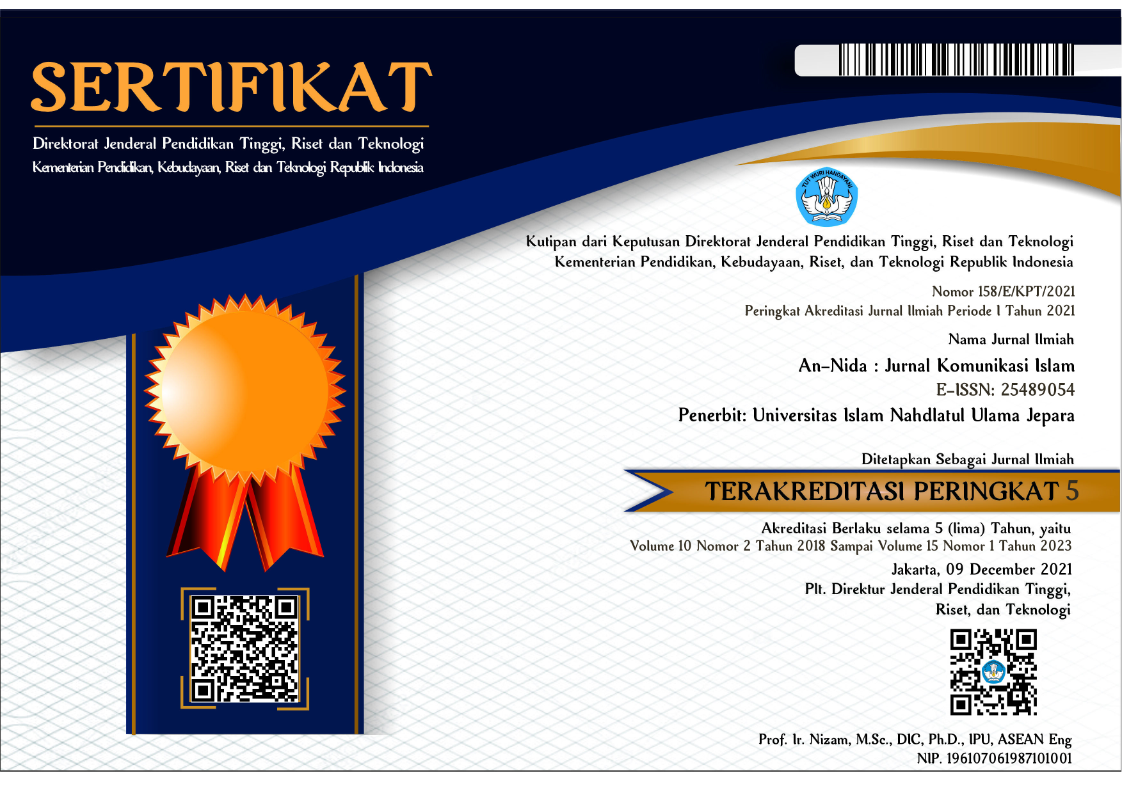DAKWAH AL-QUR?AN TERHADAP SEMANGAT ETOS KERJA
Abstract
Abstract
Keywords
Propaganda, Al-Qur?an, Work Ethics
Work ethic in Islam has been exemplified by the apostles and prophets before. When adolescence, Prophet Muhammad was a resilient merchant. Because of his hard effort, the prophet Muhammad?s bussiness was developed. Even when He was formally appointed as an apostle and leader of the people, the spirit of his work was not fading. The issue of governance, economic and military strat- egy were still worked. Nuhh good at making ships, Musa was a shepherd, prophet Sulaiman was an engineer, Prophet Yusuf was an accountant, the prophet Zakaria was a carpenter and the prophet Isa was a physician. If Allah will, the prophets were certainly able to live wallowing in luxury. Here God gives wisdom to the mankind, that the messenger of God was not only call people to worship God, but also for its natural prosperity. Muslims are trapped with the term resigna- tion and qana?ah, which is interpreted as surrender. be grateful for the blessing and good luck obtained. Whereas the essence of Islam actually put the concept of work before trusting upon the creator. This paper reveals how the views of the Qur?an to the spirit of its application at the same work ethic.
Abstrak
Etos kerja dalam Islam telah dicontohkan oleh rasul dan para nabi sebelumnya. Ketika masa remaja, nabi Muhammad saw adalah seorang pedagang yang ulet. Berkat kerja keras itu usaha dagang nabi Muhammad berkembang. Bahkan ketika resmi diangkat sebagai rasul dan pemimpin umat, semangat kerja beliau tidak luntur. Persoalan pemerintahan, ekonomi hingga strategi militer tetap dikerjakan. Nabi Nuh pandai membuat kapal, nabi Musa seorang pengembala, nabi Sulaiman seorang insiyur, nabi Yusuf seorang akuntan, nabi Zakaria seorang tukang kayu dan nabi Isa seorang tabib. Jika Allah berkehendak, para nabi itu tentu mampu hidup bergelimang kemewahan. Di sini Allah memberikan hikmah kepada manusia, bahwa para utusan Allah itu tidak hanya menyeru manusia untuk menyembah tuhan, tetapi juga untuk memakmurkan alamnya. Seringkali umat Islam terjebak dengan istilah tawakkal dan qana?ah, yang diartikan sebagai berserah, ridha dan bersyukur atas rezeki yang didapat. Padahal esensi Islam justru mendahulukan konsep bekerja sebelum bertawakkal kepada sang pencipta. Tulisan ini menguak bagaimana pandangan al-qur?an terhadap semangat etos kerja sekaligus penerapannya.
Keywords
Propaganda, Al-Qur?an, Work Ethics
Work ethic in Islam has been exemplified by the apostles and prophets before. When adolescence, Prophet Muhammad was a resilient merchant. Because of his hard effort, the prophet Muhammad?s bussiness was developed. Even when He was formally appointed as an apostle and leader of the people, the spirit of his work was not fading. The issue of governance, economic and military strat- egy were still worked. Nuhh good at making ships, Musa was a shepherd, prophet Sulaiman was an engineer, Prophet Yusuf was an accountant, the prophet Zakaria was a carpenter and the prophet Isa was a physician. If Allah will, the prophets were certainly able to live wallowing in luxury. Here God gives wisdom to the mankind, that the messenger of God was not only call people to worship God, but also for its natural prosperity. Muslims are trapped with the term resigna- tion and qana?ah, which is interpreted as surrender. be grateful for the blessing and good luck obtained. Whereas the essence of Islam actually put the concept of work before trusting upon the creator. This paper reveals how the views of the Qur?an to the spirit of its application at the same work ethic.
Abstrak
Etos kerja dalam Islam telah dicontohkan oleh rasul dan para nabi sebelumnya. Ketika masa remaja, nabi Muhammad saw adalah seorang pedagang yang ulet. Berkat kerja keras itu usaha dagang nabi Muhammad berkembang. Bahkan ketika resmi diangkat sebagai rasul dan pemimpin umat, semangat kerja beliau tidak luntur. Persoalan pemerintahan, ekonomi hingga strategi militer tetap dikerjakan. Nabi Nuh pandai membuat kapal, nabi Musa seorang pengembala, nabi Sulaiman seorang insiyur, nabi Yusuf seorang akuntan, nabi Zakaria seorang tukang kayu dan nabi Isa seorang tabib. Jika Allah berkehendak, para nabi itu tentu mampu hidup bergelimang kemewahan. Di sini Allah memberikan hikmah kepada manusia, bahwa para utusan Allah itu tidak hanya menyeru manusia untuk menyembah tuhan, tetapi juga untuk memakmurkan alamnya. Seringkali umat Islam terjebak dengan istilah tawakkal dan qana?ah, yang diartikan sebagai berserah, ridha dan bersyukur atas rezeki yang didapat. Padahal esensi Islam justru mendahulukan konsep bekerja sebelum bertawakkal kepada sang pencipta. Tulisan ini menguak bagaimana pandangan al-qur?an terhadap semangat etos kerja sekaligus penerapannya.
DOI: https://doi.org/10.34001/an.v6i2.229
Article Metrics
| Editorial Office An-Nida : Jurnal Komunikasi Islam Fakultas Dakwah dan Komunikasi Universitas Islam Nahdlatul Ulama (UNISNU) Jepara
|














